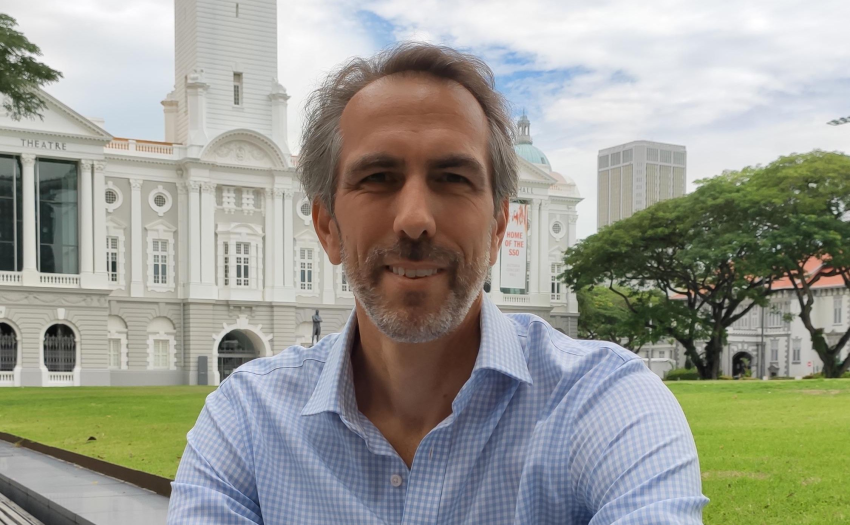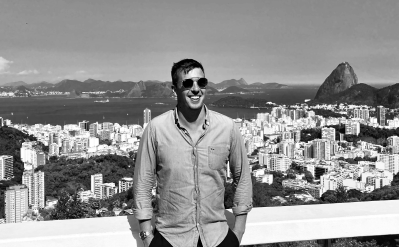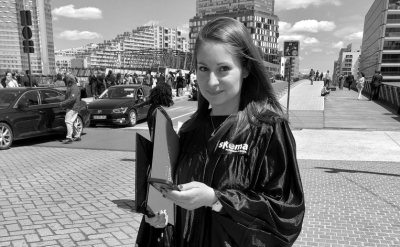News

Arnaud Boulay (SK 1997): "A serial entrepreneur in the field of new technologies"
Now an expat living in Singapore, SKEMA alumnus Arnaud Boulay is a true serial entrepreneur. He talks to us about his entrepreneurial journey and his work advising startups in the Asian market. He also shares with us his point of view on the current global health crisis.
Can you tell us about your educational background and your professional experience?
I graduated from SKEMA’s MSc in Management in 1997, with a finance major. I settled in Singapore 6 years ago, after 18 years of living overseas, including in Morocco and French Polynesia.
I have over 20 years of experience working in information and communication technologies and I’ve worked as a manager or director in different sectors such as telecommunications, communications, Web and, more recently, IoT (the Internet of Things) and FinTech.
I have a passion for solving problems in fast-changing and rapidly growing environments. I’m especially interested in disruptive innovation, but also in the ability some companies have to really set themselves apart.
I started my career in Morocco as a financial controller as part of a VIE (volunteer for international experience) programme, because I felt it necessary to expose myself to all of a company’s departments as soon as possible in preparation for my future life as an entrepreneur. I then joined the French startup Parrot as Sales Director (today they are one of the global leaders in hands-free communication accessories for mobile telephones).
With this experience under my belt, I started to invest in projects and to co-found companies. I have co-founded five companies so far: first a regional mobile telephone service network (2006), then three companies specialising in communications (Eurêkom and Impact Media in 2007, Qweeq in 2010), and finally a startup specialised in data analytics, Einsights, in 2012.
I then started advising startups, particularly through the TAG.PASS accelerator, which is backed and funded by the Singaporean government. In this role I provided guidance to Singapore-based startups and entrepreneurs specialising in e-commerce, IoT and data analytics. Sharing my experience and expertise with young entrepreneurs gives me food for thought and enables me to apply best practices across industries.
The opportunity then came up to join the Brittany-based company Kerlink, one of the pioneers and leaders of a technology for the Internet of Things called LoRa™.
The life of an entrepreneur is not exactly plain sailing, but I did eventually notice one constant in my experiences. I’ve often sought to create a bridge between the physical world and the digital world. First, with a patent filed in 2008 for a solution that keeps a real-time inventory of products sold in a shop, and then with the development of an application based on visual recognition and augmented reality, i.Media, a kind of shortcut between traditional media (TV, press and billboards) and the Web. More recently, IoT and FinTech are the fields where I’ve found the most fulfilment on my personal quest.
Today, I play a non-executive role in the companies I co-founded and I advise startups on their development strategy (business models, go-to-market, processes, and team alignment).
I am open to opportunities that would allow me to address problems that I could not solve using my expertise alone. I am searching for meaning; I guess that is what happens when you hit middle age! I am constantly looking for solutions that leverage new technologies, particularly in the human or environmental spheres.
What were the circumstances surrounding your move to Singapore?
In 2012, we planned to move to Singapore as a family because the city-state ticked all of our boxes, both on a personal and a professional level.
On the family front, we wanted to expose our children to more cultural diversity and give them the opportunity to speak several languages. Singapore offers an ideal living environment. The weather is nice year round, the city is especially well designed so you do not feel the high population density, and there are green spaces everywhere.
Professionally speaking, it was the start of a new adventure with the set-up of the company Einsights, a decision support platform (data analytics) enabling companies to perform queries in plain language and obtain insights from all of their departments (ERP, GRC, Marketing, etc.) in the form of graphs or charts. A sort of Google Search applied to business data. The company is still operating but has pivoted by creating new services.
Why did you choose to study at SKEMA?
I joined SKEMA with the idea of one day starting my own business. I grew up in a family of entrepreneurs, from father to son. My now-retired parents were business partners and the company was very much a part of our everyday life, since our house actually adjoined the shop and the workshop. This inevitably had an impact on my upbringing.
There was nothing random about my decision to study at SKEMA, because the school had launched the construction of its new campus to establish itself in very heart of the Euralille business district, which is itself situated in the heart of Lille. Since the city of Lille has a particularly dynamic economic fabric and is strategically placed at the centre of the London, Paris, Brussels triangle, I figured that SKEMA was a good forward-looking choice because the economic area plays a pivotal role. This was found to be the case for the ecosystem that has made Silicon Valley so successful.
I have no regrets, given how the school has evolved: it has gained recognition well beyond Europe as a result of an excellent positioning and a disruptive expansion strategy developed by SKEMA’s top management team. I take my hat off to Alice Guilhon and her entire team for this remarkable execution.
What were the high points of your studies at SKEMA?
I feel like I had three years of high points and I have very fond memories of my life as a student. First of all because I met my future wife at the school, but also because besides my studies my involvement in the community life as president of the sports council allowed me to form some great friendships that have endured despite the passing years and the distance that separates us.
You have maintained ties with the SKEMA network?
I have kept in contact with many people from SKEMA, yes. Social media is really helpful for that. It is funny to see how everyone has evolved.
I am an active member of the SKEMA Alumni chapter in Singapore. It is important to grow and cultivate your network, even without any ulterior motive. It is a way to stay in touch with the life of the school and to meet new people. It is also an opportunity to interact, to share, to give advice sometimes, and to be a sort of mentor.
We organise a relatively informal monthly meetup, as well as four big events with a set theme over the course of the year. Besides that we also organise some sports events. We get to have an enjoyable time together.
What advice do you have for young SKEMA graduates?
I think that students who get involved in the school’s associations have the chance to gain some great experience without really taking any risks. The way I see it, this is an opportunity that should be seized. I also think it is crucial to be interested in everything, to be curious and bold. In life, we should never stop learning.
Professionally speaking, what has the current health crisis taught you?
When a crisis hits, we can react in one of two ways: exploit what exists already to the max and/or pivot by exploring new growth drivers.
To me, the companies that will pull through the crisis most successfully are those that are able to reinvent themselves and adapt to the changes in their environment. It is important for companies to optimise the existing, because this requires little effort and they already know their market inside out. It is just as vital to explore new opportunities, because these can be growth drivers and a way to secure the future of the organisation.
In this context, the global dimension is an advantage. Agility, creativity and work practices are other assets that help the most well-prepared organisations to weather the storm and maintain a level of productivity that will not jeopardise their existence.
If we take SKEMA as an example, with its seven campuses the school is a microcosm of our globalised world. SKEMA offers all of its study programmes online on five continents, which is a great alternative when travel is no longer possible. The school is in step with its time and seems to do well at anticipating evolutions in our society with a strategic vision and probably a process of long-term scenario planning.
This scenario planning is exactly what I recommend doing. Although it is not possible to anticipate everything, we can at least come up with hypotheses and think about what we would do if such an event were to occur. Singapore does a great job of this. The country has taken the necessary measures to ensure that the COVID-19 pandemic affects neither its citizens nor its economy, and they are working remarkably well.
I think that this crisis will have at least a few positive effects, like accelerating the adoption of technologies in the education and work spheres. The second effect will hopefully be an increased awareness of how our carbon footprint affects the health of the planet.
Contact: Arnaud Boulay (SK 1997) - Arnaud is also partner of the association Time for Planet. To learn more about this association.
Interview by lepetitjournal.com for SKEMA Alumni




